The Toy Blu-ray Movie
HomeThe Toy Blu-ray Movie 
Image Entertainment | 1982 | 102 min | Rated PG | Jan 24, 2012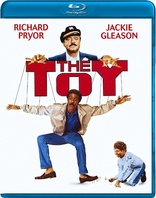
Movie rating
6 | / 10 |
Blu-ray rating
| Users | 4.0 | |
| Reviewer | 2.5 | |
| Overall | 2.9 |
Overview
The Toy (1982)
Writer Jack Brown needs a job to save his house from foreclosure, but the only job he can find is as a "cleaning woman" in the department store owned by tycoon U.S. Bates. There Jack is seen working by Eric Bates, the tycoon's spoiled but lonely son, who is home from military school for his annual one-week visit. Eric's father has said he can have "anything" in the store -- and Eric wants Jack!
Starring: Richard Pryor, Jackie Gleason, Ned Beatty, Scott Schwartz, Teresa GanzelDirector: Richard Donner
| Comedy | Uncertain |
| Family | Uncertain |
Specifications
Video
Video codec: MPEG-4 AVC
Video resolution: 1080p
Aspect ratio: 1.85:1
Original aspect ratio: 1.85:1
Audio
English: LPCM Mono
Subtitles
English SDH, Spanish
Discs
25GB Blu-ray Disc
Single disc (1 BD)
Playback
Region A (B, C untested)
Review
Rating summary
| Movie | 1.5 | |
| Video | 4.0 | |
| Audio | 3.0 | |
| Extras | 0.0 | |
| Overall | 2.5 |
The Toy Blu-ray Movie Review
Caution: Choking Hazard
Reviewed by Michael Reuben January 19, 2012Although I haven't seen the 1976 French film Le jouet on which The Toy is based, consensus holds it to be superior to the American remake. I don't doubt it, because the remake is a mess. It features the bizarre pairing of Jackie Gleason and Richard Pryor, neither of whom is used to good advantage. It's directed by the usually reliable Richard Donner, who's so off his game that he can't even maintain continuity over the beard sported by Pryor's character, a plot point that miraculously morphs from scraggly to bushy in the film's first quarter hour before it's mercifully shaved off. So what chance does Donner have with the screenplay by Carol Sobieski (who also adapted and co-produced Annie, which should tell you something right there), a meandering yarn that wavers between a sappy family drama about an estranged father and son, a morality tale about a super-rich capitalist who supposedly learns a lesson about humanity (but doesn't) and a satire about political opportunism, selling your soul for a buck and . . . well, I'm not sure what exactly, but I do remember a pie fight. Pryor had already demonstrated in appearances on Saturday Night Live that he could be hilarious within PG confines, but the film's unfocused plot never lets him settle into a workable comic rhythm. And Gleason wasn't given a character to play, just a slogan suitable for rabble-rousing. (Today his character would be called a "One Percenter".) If director Donner saw the problems (and I suspect he did), he either didn't have the leverage to fix them or couldn't figure out how. The result is a film with a few interesting moments scattered among sequences that not only don't make sense, but also—and more importantly—just aren't funny.
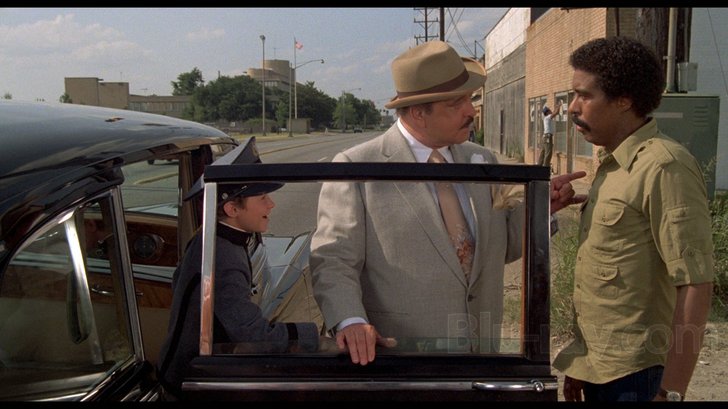
Jack Brown (Pryor) is an unemployed journalist in Baton Rouge, Louisiana, who insists that he still has a "job", because he's writing a book. But since no one's paying him, and his live-in girlfriend, Angela (Annazette Chase), doesn't earn much as an attorney for "Klan Watch", which seems to be a cross between Legal Aid and an activist group, Jack's house is on the brink of foreclosure. Jack's bank won't even consider granting him an extension unless he holds gainful employment. The meeting at which Jack receives this news doesn't occur at the bank but at an aerobics class largely attended by women and Jack's hound dog banker, Stanley (Tony Burton), because that's how desperate The Toy is for comedic "business". So Jack bluffs his way into a part-time job as a cleaning woman (yes, that's a cleaning woman) for a huge department store in the multi-tentacled empire owned by U.S. Bates (Gleason). The scene where Jack threatens Bates's store manager, Morehouse (Ned Beatty), with a messy discrimination lawsuit in order to get the job, is an example of the rare scene that works in The Toy, because it proceeds from character. Morehouse is a corporate drone who lives in daily terror of making a decision that will get him fired, and Jack, sensing that weakness, uses it to make not hiring him seem more dangerous than hiring him. But the scene is quickly followed by one in which Morehouse, having made a big point about Jack shaving off his beard (but not his moustache) so that he'll blend in better, lets Jack serve luncheon to Bates and his department heads while wearing a maid's uniform. Yes, drag is classic slapstick, but there's no logic to a gag that makes Jack conspicuous when he's supposed to be conforming. The point of the scene is to set up a comic confrontation between Pryor's resentful Jack and Gleason's haughty Bates, but it can be done without drag and without contradicting the prior narrative, especially since the scene has another, better gag involving a long boardroom table. The same slapdash quality prevails for the rest of the film. Bates's son, Eric (future porn star Scott Schwartz), arriving home from military school for his annual week with his father, is told he can have anything he wants from his father's store. He sees Jack vacuuming one of the window displays, and says, "I want him!" After some haggling over compensation, Jack relocates to the Bates mansion as Eric's "toy", which really just means Eric's friend—of which, not surprisingly, Eric has none. Despite the uniform, nothing about him suggests any of the self-control or discipline that military schools are supposed to instil. He's all brat, all the time. The only people who put up with him are those who are paid to do so, and it falls to Jack (a big kid himself) to "civilize" the boy to the point where he can say what he really wants (namely, his father). So much for the family plot line. In the economic morality tale, we get to watch U.S. Bates teach Eric and Jack all sorts of hard truths about the way of the world and the power of money (as if people without money are clueless about its power). The scene in which Bates, Sr. forces Morehouse to drop his pants in front of Eric and Jack if he wants to keep his job is particularly odious, because (a) it isn't funny, and (b) it doesn't lead anywhere. Yes, it makes the point that Eric's notion of a person as a "toy" is rooted in his father's treatment of other people as objects, but so what? It's not as if U.S. Bates has actually changed by the end of the film. Yes, Eric and Jack run around creating a little newsletter that's a scandalous exposé of Bates and his world, but nothing happens. Eric returns to military school, and Jack gets the job he always wanted at Bates's newspaper, the Baton Rouge Bugle, where—who knows?—some day he too may have to drop his pants. And does anyone really believe that, no matter how his relationship with Eric may have improved, U.S. Bates will abandon the kind of underhanded political maneuvering that Angela and her cohorts from Klan Watch showed up to protest? The old empire builder hasn't changed his ways, and anyone who plans to gain control of the whole of "south central Louisiana" has to get his hands dirty. The film shows Bates throwing a party for the KKK's Grand Wizard (Orwin C. Harvey) to which he invites a Senator in an effort to arrange a photograph of the two men shaking hands (without the Senator's knowledge, of course). Jack and Eric disrupt the event, leading to the aforementioned pie fight. But what happens when Jack and Eric aren't there? Does anyone really believe that Bates has given up these little "interventions"? Unlikely, since, as he takes Eric back to military school, he utters the tritest excuse in the miscreant's handbook: I do it all for you, son. (The Corleones were fond of the same justification.) None of this fits together, because none of it really means anything. It's all so much random fuel tossed on the hearth in the hope that something will ignite a few laughs. And I haven't even mentioned the dotty English butler (Wilfrid Hyde-White), the martinet German nanny (Karen Leslie-Lyttle) and the bimbo second wife (or maybe third or fourth) (Teresa Ganzel), whose brain seems to have shrunk in inverse proportion to her cup size. They all look as lost in The Toy as Jack Brown. Pryor and Gleason deserved better.
The Toy Blu-ray Movie, Video Quality 
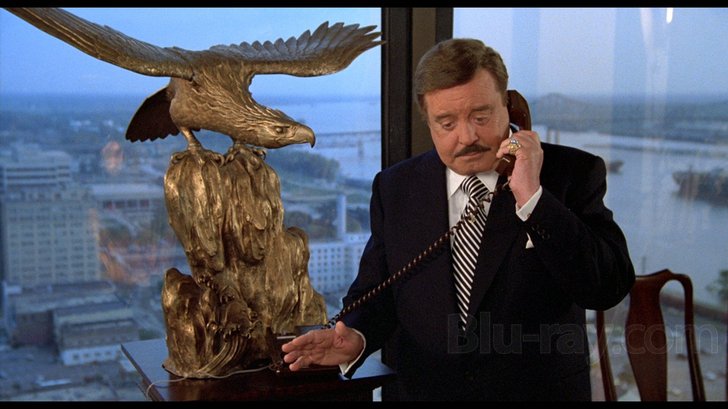
Whatever the shortcomings of the film itself, there is nothing to fault in Image's 1080p, AVC-encoded Blu-ray, which is yet another impressive presentation of a Sony catalog title. Either the source material is in excellent shape, or it has been expertly restored, but in any case the late László Kovács' colorful cinematography is beautifully reproduced, starting with what is possibly the film's best sequence: the opening titles with the credits engraved on oversized children's wooden blocks arranged among stuffed animals. The rest of the film's image is nicely detailed, whether shot on soundstages or in outdoor locations, with grain that is visible but natural and not intrusive except for a few short scenes of Jack and Eric hiking (where the graininess is almost certainly source-based). By contemporary standards of digital enhancement, the film's image might be considered "soft", but the softness is consistent both with photographic techniques of the period and with Kovács' usual style, and it certainly doesn't come at the expense of fine detail in faces, decor and clothing. As one might expect, colors tend to be brighter and more varied in the Bates mansion than in Jack's neighborhood, and Pryor's Jack frequently wears something that stands out in a crowd, as befits both Pryor's stardom and Jack's status as a "toy". The colors on the Blu-ray are distinct without being overly saturated. Black levels are very good with only traces of minor crushing in deep shadows (and here again, this appears to be source-based). I saw no indication of high frequency filtering, artificial sharpening or compression artifacts.
The Toy Blu-ray Movie, Audio Quality 
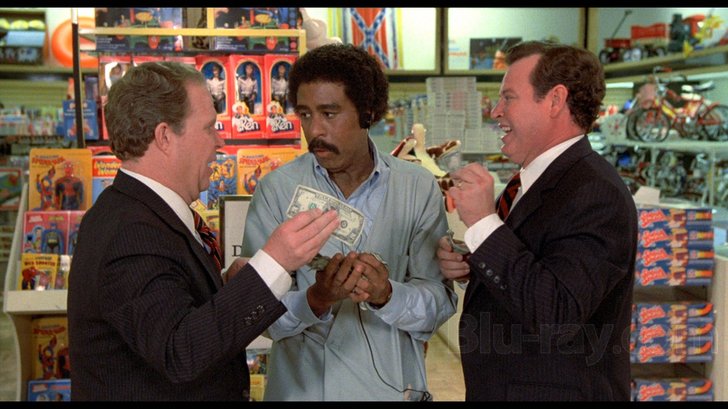
The original mono soundtrack is presented as PCM 2.0. When played through a good set of stereo speakers in "direct" mode, the track should provide a wide soundstage, much like a typical theatrical array. When played through a matrix decoder, the two identical channels should collapse to the center speaker of a typical home theater array. Either way, the dialogue is clear, and the serviceable score by Patrick Williams (like director Donner, a TV veteran) is reproduced with pleasant musicality and sufficient dynamic range.
The Toy Blu-ray Movie, Special Features and Extras 
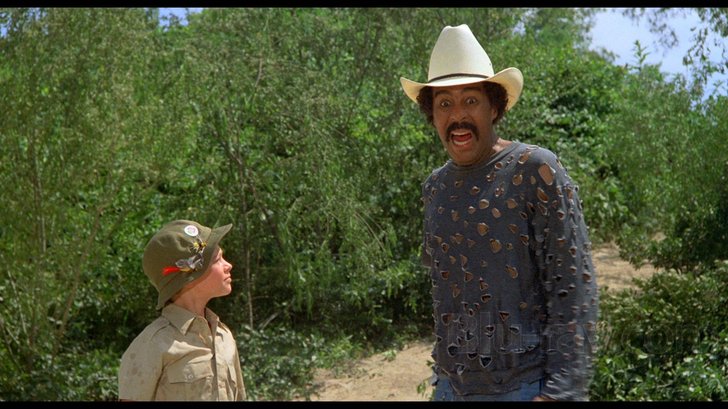
I don't have Sony's 2001 DVD release of The Toy for comparison, but I have been advised by a reader who does that it contained only "bonus" trailers and not the film's trailer. In any case, the Blu-ray contains no extras.
The Toy Blu-ray Movie, Overall Score and Recommendation 

If you're already a fan of The Toy, or you're a Richard Pryor or Jackie Gleason completist, then you won't be disappointed by Image/Sony's presentation of the film on Blu-ray. If you want to see either of these great talents doing the kind of comic work that made them icons, look elsewhere. This is a film that is most definitely not recommended.
Similar titles
Similar titles you might also like

Short Circuit
1986

Stir Crazy
1980

Diary of a Wimpy Kid: Dog Days
2012

Swing Vote
2008

Super Troopers 2
2018

Night School 4K
2018

Get a Job
2016

Barbershop
The Next Cut
2016

Tammy
Extended Cut
2014

Chef
2014

Designing Women: Complete Series - Seasons 1 - 7
1986-1993

Canadian Bacon
1995

Keep 'Em Flying
1941

Soap: Complete Series - Seasons 1 - 4
1977-1980

See No Evil, Hear No Evil
1989

A Madea Christmas
2013

Jack Frost
1998

Bringing Down the House
10th Anniversary Edition
2003

Diff'rent Strokes
1982

Daddy Day Care
2003